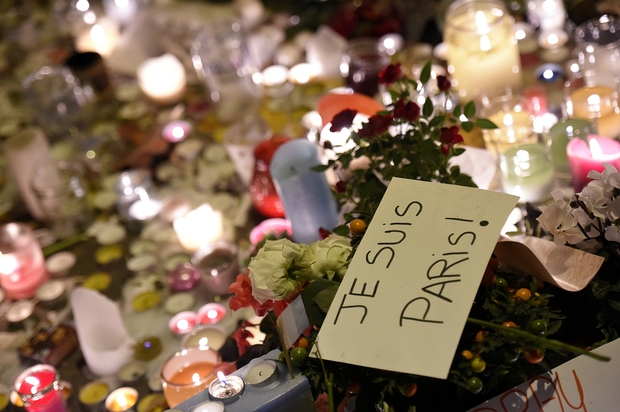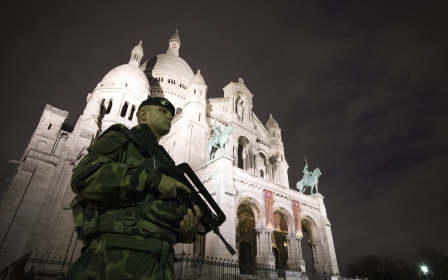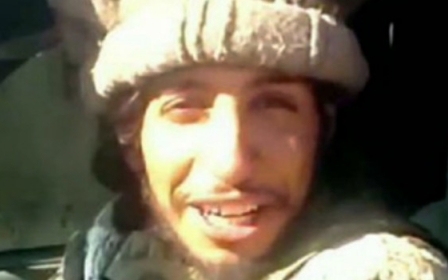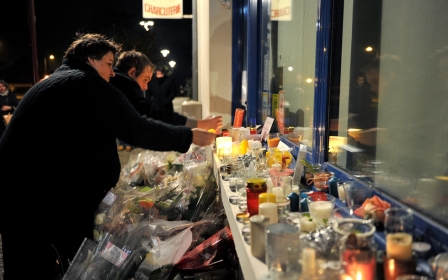Parisian youth in shock: 'Those are my streets, forever'

PARIS - Paris wakes up, cold and in pain after last Friday’s bloodbath.
On the metro, Parisians are stricken by an oppressive silence, people passing by, sneaking in and out like shadows. Heavily armed military officers guard the entrances. Everyone is on the lookout when the doors open, suspiciously staring at each other. Loud and charmingly rude Parisians are no longer all standing at a distance from one another in an empty underground. They now better understand these words from Jacques Brel: “The metro zips by, filled with all its drowned victims.”
Fear and words everywhere
In the streets, smartphones ringing and beeping everywhere. “Yes I did take the metro, but it’s all fine, I’m at the office now,” says Anne, 33, reassuring not only her mother in Lyon but herself too. “We must carry on, live our lives as normally as we can, otherwise it would mean they have won. Of course I’m scared, I’m terrified. When I’m in the train I stare at everybody. This is how things are for the moment.”
Around Oberkampf area, not far from where the attacks took place, we meet with two young men in their thirties, enjoying a beer at the terrace of a typical Parisian cafe. It is only 9:30 in the morning and it is quite chilly out there.
“It might look very strange indeed, but enjoying a drink in a terrace is a powerful act, we are saying to those people who committed those crimes: we won’t let you win,” they tell Middle East Eye.
“We are actually heading to work now, but we felt we needed to do that big gesture.” They cheer at people passing by in the streets.
On Rue Charonne, loads of flowers, candles and letters are found in front of the restaurant La Belle Equipe, where 19 people were killed. Ilyés came with his friend Marie. They are both holding a bouquet, well-wrapped:
“When I told the florist these were for the victims of the attacks, he added few white lilies,” whispers Marie.
Ilyés, 25, originally from Morocco, is an engineering student. He lives in the neighbourhood, and he knew the restaurant very well; he even celebrated his birthday there once.
“The owner lost his wife and eight close friends and employees. This neighbourhood is like a little village; we all know each other. This is Paris, a bunch of little villages. I don’t understand what happened, I really don’t. At work I’ve been asked if my religion accounts for those actions. I just put my head down.”
He wipes his tears, grabs Marie’s hand, and they both leave.
On Boulevard Voltaire, in front of the Bataclan theatre, the same flowers, same candles, same letters and same worried looks. For Sarah, 31, it is like a pilgrimage.
She tells MEE she had to go to all the places in the 10th and 11th Arrondissement where blood was shed, to pay her respects. She wears a flashy scarf around her head, and she lives in the neighbourhood.
“Those are my streets, forever,” she says gasping. “This neighbourhood is the symbol of a popular mixture of cultures. Almost every night the terraces and restaurants - Turkish, Arab, French, Italian - are packed! Those terrorists wanted to destroy a way of life, our way of life. We won’t let them win. The daughter of a colleague of mine was at the concert that night. Sadly, we all directly or indirectly know someone that was there.”
In the Latin quarter, heart of the student life, the atmosphere has shifted. In a cafe, a group of students is debating, trying to distance themselves, intellectually, from those tragic events.
Paul, a 23-year-old student at Paris Institute of Political Studies, tries to theorise the attacks using Clausewitz "On War" references.
“Terrorism has become another form of doing politics,” he says. “It is not just pure madness. We need to understand their motives in order to fight them effectively.”
Margot, 20, a liberal arts student at La Sorbonne University, tries to shush him: “Please give us a break, there’s nothing to understand here. Francois Hollande was right, this is war, the only thing left to do is bomb them."
Lylia, 19, timidly protests: “Then what, make them even angrier? If we get even more involved, they will definitely retaliate. This needs to end.”
“So 2017, Marine LePen or not?” Someone murmurs, referring to the president of the right-wing National Front party.
Paul shrugs his shoulders and says: “She says some truths but I cannot picture her as the next president. We need to get together and not split. And this is actually what her electoral campaign is based on.”
Meanwhile, in the working-class neighbourhoods...
Up north, in the 18th Arrondissement, on Barbes Street, all activities seem to have stopped. In this usually busy and popular area of Paris, known as Little Arabia and Little Africa, we meet Tarik who owns a fabric shop.
He offers us some tea and says in a gasp: “Once again we’re gonna pay for this. Yesterday my daughter went to the mosque for her Arabic class, but she was told to go back home because it had been cancelled. I’ve already heard that attacks against Muslim people have soared. There were Muslim people among the victims right? Either way, we are trapped.”
His daughter, Alya, 15, arrives from school, and she has things to say: “Why would it be my fault? I haven’t done anything. I was born in France. How come whenever we talk about terrorism we’re only pointing at Muslim people. What are French soldiers doing in Syria? We asked our history teacher if the bombings in Syria have killed civilians too. She didn’t know how to answer.”
Her dad gasps again, and she adds: “At the end of the day, this needs to be said.”
A few streets down is Myrha Street, famous for its Muslims praying on the street on Fridays because of the lack of space in the mosque. Le Pen has even compared it to the German occupation of France during World War II.
Sofiane, 27, says: “I’m Tunisian. I arrived in France two years ago. My sister lives in the outskirts, in Bobigny. I know exactly how Parisians feel. We went through the same trauma, the attacks, the craziness … Those people are not Muslims, I cannot believe it. Well… I don’t know if they are actually, but they are weird ones then.”
In La Courneuve, in a housing project called “The 4,000” where an underprivileged population lives, Marwan, Dalil and Anthony are sipping their coffees. Marwan, 28, a student, calls himself a Muslim, but “an easy-going one”.
His two friends, Dalil, originally from Senegal, and Anthony, half French-Turkish, half Portuguese, tell him off: “Come on mate, stop trying to justify yourself, you did not commit those crimes. We’ve told again and again that here in France, Muslim people are ‘easy going’. It won’t do.”
Marwan argues: “You have no idea what is it like to be Muslim here in France. You’re living your life, minding your own business, having a nice groomed beard but still people look at you as if you were a criminal. The other day a woman got off the train when she saw me. What’s wrong with her? I haven’t done anything.”
What now?
Madjid Messaoudene is an elected member of the left-wing Parti de Gauche in Saint-Denis, the actual town where the Stade de France is located. He is from an immigrant family of Algerian background and he says wants to speak up.
“When I gathered that attacks were happening, I told myself: 'Inshallah no Arabs are involved.’ I got it all wrong. There were eight of them … Those people wanted to kill the people, its soul, its diversity.”
He goes on: “We need to rethink our foreign policy. We really thought that nothing would happen to us if we got involved in Syria and Iraq? We bombed the city of Raqqa. How are supposed to do that without killing civilians? Explain it to me please.”
“The human cost is too high. If we only explain the situation in the Middle East through the jihadist aspect of it, saying those people are mad, are lost, it is like not acknowledging the victims. It is disrespectful,” Messaoudene tells MEE.
“And once again, the bad guys are Muslim people. The national unity is threatened. How come young people who were born in remote places in France would go to Syria? How come France is under attack and not Sweden or Portugal? We need answers, and not only military ones, which is the case at the moment.”
Samia Hathroubi, a member of a charity that is campaigning for inter-religious dialogue, says the same.
“I was not surprised by the attacks but more by the size of them. How did they get to central Paris?” Hathroubi says.
“I was shocked when we were asked to publicly show that we condemn those acts. Obviously we are not supporting them! Why are they still being suspicious like that? We need to understand the globalisation of this world. Why would we think it would stop at our borders?” she asks.
“Sadly the victims represent well what France is: young and multicultural. This is what the terrorists were targeting. That way, as French people, we are all victims of them. For instance, a friend of mine, Fatoumate, who wears the hijab, she hasn’t been out for two days now. Me and her are not living the same reality. Obviously I’m less ‘visible’ than her. But we won’t cave in.”
This article was originally published on MEE's French page and translated by Nassima Demiche.
Middle East Eye propose une couverture et une analyse indépendantes et incomparables du Moyen-Orient, de l’Afrique du Nord et d’autres régions du monde. Pour en savoir plus sur la reprise de ce contenu et les frais qui s’appliquent, veuillez remplir ce formulaire [en anglais]. Pour en savoir plus sur MEE, cliquez ici [en anglais].




